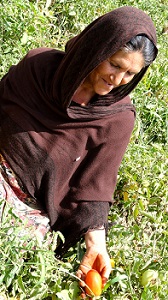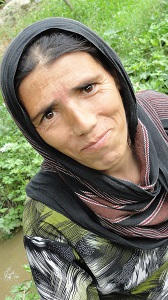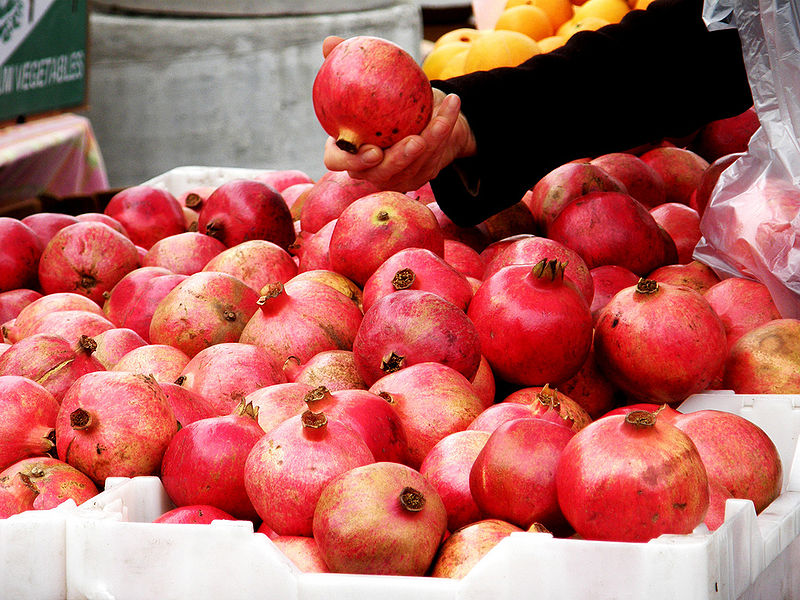It’s hard to believe that Afghanistan was once considered the “orchard of Central Asia.”
In the 1970s, about 60% of the world’s dried fruit came from Afghanistan with fruits and nut exports making up about 40% of the country’s foreign exchange with bountiful vineyards, farms and forests peppering the nation’s terrain landscapes. After years of drought, conflict and the Taliban rule, the war-torn country now stands as one of the poorest in the world.
The Global Partnership for Afghanistan, an NGO based in Kabul, however, aims to return Afghanistan to its former glory by working with rural Afghans to create farm businesses to build sustainable livelihoods and renew the once prosperous environment. Since its launch in 2004, GPFA partners with governments and individuals to provide capital, supplies and support to help rebuild Afghanistan’s agricultural economy.
GPFA has also launched the “Farm-to-Market” initiative that selects a group of small-scale Afghan women and provides them with the training, supplies, equipment and access to larger markets needed to enable and empower them to become successful business entrepreneurs and business women in wholesale fruit, vegetable and honey distribution, packaging and production. Their incredible initiative has also been selected as a finalist in the Women Powering Work: Innovations for Economic Equality in the MENA Region competition, launched by Ashoka Changemakers and GE. We had a chance to speak with GPFA Development and Communications officer Kate McLetchie about their work and its impact on Afghan farm families and women’s empowerment:
Elan: Tell us a little about the Farm to Market: Seeding Afghan Women Entrepreneurs initiative. How did it begin and what was the inspiration behind it?
Kate McLetchie: GPFA’s Farm to Market initiative with Afghan women isn’t a new concept for us altogether, but rather something we are trying to bring to the forefront of our work with farmers. For the past decade we’ve been helping both Afghan men and women launch or enhance their farm businesses after the devastation their land and livelihoods suffered from years of war. Of the 30,000 farm enterprises we’ve supported one-third have been women-led.
 So although we’ve always included women in our programs, it became clear to GPFA in recent years that a special focus on strengthening the earning power of women in agriculture was critical to the country’s future, particularly since the great majority of the women-owned farm businesses are currently at the micro- or subsistence level.
So although we’ve always included women in our programs, it became clear to GPFA in recent years that a special focus on strengthening the earning power of women in agriculture was critical to the country’s future, particularly since the great majority of the women-owned farm businesses are currently at the micro- or subsistence level.
A major obstacle to the growth of women’s farm businesses is women’s lack of access to markets, as typically it is the men in a family who interact with wholesalers and other business-owners. This Farm to Market project seeks to empower women to take their businesses to that next level in order to truly reap the economic benefits of their work. So instead of just focusing on the production side of agriculture we are focused on helping women to develop their leadership and technical skills and move them into positions as wholesale marketers and collection center owners for produce and working with others to develop their honey, dried fruit, and other value-added businesses.
For each entrepreneur we provide a tailored package of support that includes inputs (i.e., the seed funding and materials required to get their small business off the ground) and training in business development, management, and functional literacy skills, if needed. We work with each entrepreneur for a minimum of one year. What we’re driving at is that we don’t just help a woman grow better apples, because if this is all we did she would just hand the apples to her husband or son to sell in the market. Instead, we help her dry the apples, package and label them attractively, and reach out to potential customers like grocery stores.
It’s a higher-level business, and it takes more investment in time and money, but these women are entrepreneurs at a completely different level – a higher one – that provides a successful and obtainable model for other women to emulate.
Elan: Why is such an initiative crucial for women in Afghanistan and the Middle East?
KM: In Afghanistan, three-quarters of women live in rural areas and represent more than 50 percent of farm labor. So it is critical to create economic opportunities to reach this population – if we are not doing this then we are denying the majority of Afghan women the opportunity to earn an income. Countries cannot reach their potential while leaving half their population behind.
Elan: What are some of the barriers you have had/are continuing to face with the launch of this initiative? How did you overcome them?
KM: Barriers include insecurity and uncertainty surrounding the withdrawal of NATO troops and the April 2014 elections. However, GPFA has a longstanding reputation for our ability to work in insecure locations and uncertain environments, as our past activities demonstrate. Our strategy of engagement with multiple levels of the government and local Shura Councils ensures the project’s acceptance by everyone in and around the community. Our staff is Afghan, many of whom come from the communities where we work, and therefore we do not have the same security concerns we would with an expatriate staff.
Elan: Some organizations in Afghanistan don’t necessarily focus on women’s economic empowerment in the agriculture sector or provide the “value chain” support critical for creating a sustainable agricultural ecosystem. How does GPFA address these concerns?
KM: Most organizations that support women’s “empowerment” are more focused on rights and advocacy than on economic development. We very much believe that a stable society is rooted in a stable economy and that the best thing we can do for Afghanistan is provide opportunities for women – and men – to create sustainable livelihoods.
 Gender roles in Afghanistan tend to create divisions between work roles. Women often weed, water, and harvest farm produce, yet men transport it and make the sales. This arrangement keeps women at home, with no independent source of income, and unable to listen to customer feedback that might change their methods of production. As a result, women remain as laborers, and not owners and decision-makers.
Gender roles in Afghanistan tend to create divisions between work roles. Women often weed, water, and harvest farm produce, yet men transport it and make the sales. This arrangement keeps women at home, with no independent source of income, and unable to listen to customer feedback that might change their methods of production. As a result, women remain as laborers, and not owners and decision-makers.
It’s good for women and men to work together, especially within families, but enabling a woman to work outside the home empowers her to grow and make decisions she could not otherwise make. It’s notable that in our projects, once we do the groundwork to get the men in communities on board, they encourage their wives and sisters to participate because they see how it could benefit the entire family.
But despite this we have noticed that much of the development funds available to the agricultural sector in Afghanistan are designated for men. Recent projects have required 15% of “beneficiaries” to be women – just 15% when they are more than 50% of the farm labor! And that’s just for farming.
We’ve noticed women’s economic empowerment activities focused on handicrafts, such as jewelry and carpet-making. But very little for expanding on what women are already doing – farming – and growing this sector that is critical to Afghanistan’s economy. We aim to change that.
Elan: Why do you think economic equality is so important in the Middle East and North Africa region?
KM: When women have more income from their own labor their highest priority, after feeding their families, is educating their daughters and sons, thereby enhancing the next generation’s earning power and literacy rate. Simply put, empowering rural women to increase their incomes also enhances their communities’ security, stability and opposition to extremism – economic stability is a precursor to sociopolitical stability.
Elan: What advice would you give to women who are seeking employment in Afghanistan or the wider MENASA region?
KM: Look to other women in your community who are successfully employed as role models and learn as much as you can from them. Seek out opportunities for literacy, technical, and other trainings to increase your skills. Join an association or other group of like-minded women and support one another in your endeavors. And most importantly never give up – failure and setbacks are a critical part of the roadway that ultimately leads to success.
Editor’s Note: Additional information about the competition, assessment criteria and fascinating trends that are emerging from the finalists’ solutions can be found at www.changemakers.com/
Follow #womenWork on Twitter to receive the latest on trends and competition news.




















[…] Global Partnership for Afghanistan: Renewing the former “Orchard of Central Asia,” one farmer at…December 20th, 2013. […]